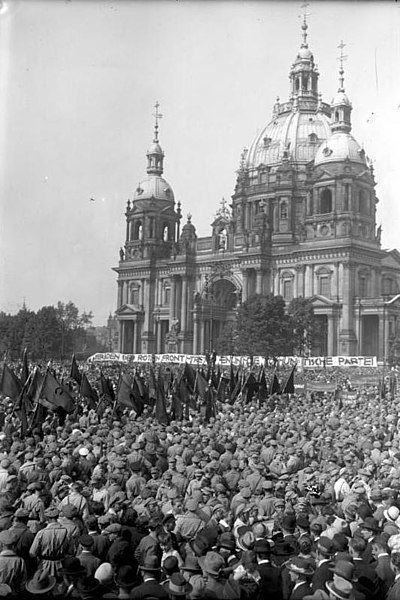Antifa is a political movement in Germany composed of multiple far-left, autonomous, militant groups and individuals who describe themselves as anti-fascist. According to the German Federal Office for the Protection of the Constitution and the Federal Agency for Civic Education, the use of the epithet fascist against opponents and the view of capitalism as a form of fascism are central to the movement. The antifa movement has existed in different eras and incarnations, dating back to Antifaschistische Aktion, from which the moniker antifa came. It was set up by the then-Stalinist Communist Party of Germany (KPD) during the late history of the Weimar Republic. After the forced dissolution in the wake of Machtergreifung in 1933, the movement went underground. In the postwar era, Antifaschistische Aktion inspired a variety of different movements, groups and individuals in Germany as well as other countries which widely adopted variants of its aesthetics and some of its tactics. Known as the wider antifa movement, the contemporary antifa groups have no direct organisational connection to Antifaschistische Aktion.

Karl-Liebknecht-Haus, the historical seat of the Communist Party of Germany and Antifaschistische Aktion, with prominently displayed its logo
The congress organised by the KPD in 1932, with Antifaschistische Aktion' logo flanked by Soviet banners (centre), imagery showing the KPD fighting capitalism (right) and imagery mocking the centre-left SPD (left), regarded by the KPD as social fascists
The Berlin Wall was officially referred to as the Anti-Fascist Protection Wall by East Germany.
Antifa protester in Cologne, 2008
Anti-fascism is a political movement in opposition to fascist ideologies, groups and individuals. Beginning in European countries in the 1920s, it was at its most significant shortly before and during World War II, where the Axis powers were opposed by many countries forming the Allies of World War II and dozens of resistance movements worldwide. Anti-fascism has been an element of movements across the political spectrum and holding many different political positions such as anarchism, communism, pacifism, republicanism, social democracy, socialism and syndicalism as well as centrist, conservative, liberal and nationalist viewpoints.
An Italian partisan in Florence, 14 August 1944, during the Italian Civil War
Dutch resistance members with U.S. 101st Airborne troops in Eindhoven, September 1944
1931 badge of a member of Concentrazione Antifascista Italiana
1928 Roter Frontkämpferbund rally in Berlin. Organized by the Communist Party of Germany, the RFB had at its height over 100,000 members.








